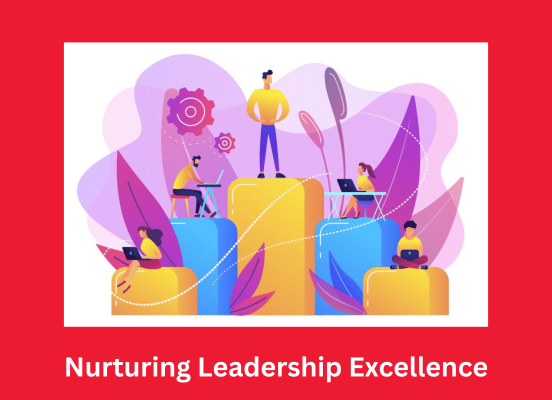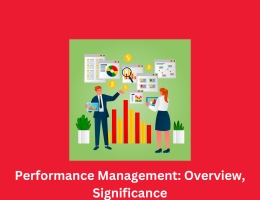
Nurturing Leadership Excellence: Unveiling the Dynamics of Leadership Development
- By admin --
- Wednesday, 13 Mar, 2024
In the dynamic landscape of professional growth, the journey from being a proficient individual contributor to a competent leader is marked by a transformative process of leadership development. As professionals ascend the ranks and assume positions of greater responsibility, cultivating effective leadership skills becomes not just desirable but imperative. Leadership transcends mere management; it embodies the ability to inspire, influence, and guide others towards shared goals, fostering a culture of collaboration, innovation, and excellence. In this comprehensive exploration, we delve into the intricacies of leadership development, unveiling the core competencies, strategies, and best practices that underpin successful leadership in the modern workplace.
At its essence, leadership development entails a deliberate and systematic process of honing one's abilities, attitudes, and behaviors to become an effective leader. It encompasses a multifaceted array of skills, ranging from communication and decision-making to emotional intelligence and strategic thinking. As professionals progress in their careers, they must recognize the pivotal role that leadership plays in driving organizational success, inspiring teams, and navigating complex challenges. By investing in leadership development, individuals not only unlock their full potential but also empower others to thrive and excel in a collaborative work environment.
Communication stands as the cornerstone of effective leadership, serving as the linchpin for fostering trust, alignment, and clarity within teams. Leaders must master the art of articulating a compelling vision, conveying expectations, and providing constructive feedback in a manner that resonates with diverse audiences. Whether it's delivering presentations, facilitating team meetings, or engaging in one-on-one conversations, effective communication empowers leaders to inspire confidence, foster collaboration, and cultivate a culture of transparency and accountability. By honing their communication skills, leaders can bridge divides, resolve conflicts, and foster a sense of belonging and camaraderie within their teams.
Decision-making prowess is another hallmark of effective leadership, distinguishing adept leaders from their counterparts. Leaders are often tasked with making tough decisions under conditions of uncertainty, ambiguity, and competing priorities. They must possess the ability to analyze complex situations, weigh alternative courses of action, and make sound judgments that align with organizational goals and values. Effective decision-making requires a blend of analytical thinking, emotional intelligence, and strategic foresight, enabling leaders to navigate risk, seize opportunities, and drive positive outcomes. By cultivating decision-making skills, leaders instill confidence in their teams, inspire trust, and engender a culture of innovation and adaptability.
Team management lies at the heart of leadership development, encompassing the ability to inspire, motivate, and empower individuals to achieve collective goals. Leaders must adeptly navigate the dynamics of team composition, fostering a culture of diversity, inclusion, and collaboration that harnesses the unique strengths and perspectives of each team member. Effective team management entails setting clear expectations, delegating tasks, providing mentorship and support, and fostering an environment of mutual respect and trust. By cultivating strong interpersonal relationships, recognizing and leveraging individual talents, and promoting a shared sense of purpose, leaders foster a high-performing team culture that drives organizational success.
Emotional intelligence emerges as a critical component of leadership development, enabling leaders to navigate complex interpersonal dynamics, inspire trust, and foster authentic connections with their teams. Leaders with high emotional intelligence possess self-awareness, self-regulation, empathy, and social skills, allowing them to navigate challenging situations with grace and composure. They are attuned to the emotions and needs of others, adept at managing conflict, and skilled at building rapport and trust. By fostering a culture of psychological safety and empowerment, emotionally intelligent leaders create an environment where individuals feel valued, supported, and motivated to contribute their best work.
Strategic thinking is a fundamental competency of effective leadership, enabling leaders to anticipate future trends, identify opportunities, and chart a course of action that aligns with organizational objectives. Leaders must possess a keen understanding of the broader business landscape, including market dynamics, competitive pressures, and emerging technologies. They must leverage data-driven insights, industry knowledge, and stakeholder input to formulate strategic plans that drive sustainable growth and competitive advantage. By fostering a culture of innovation, experimentation, and continuous improvement, strategic leaders inspire creativity, adaptability, and resilience within their organizations.
Mentorship and coaching play a pivotal role in leadership development, providing aspiring leaders with guidance, support, and wisdom gleaned from experienced mentors and coaches. Mentorship involves a reciprocal relationship characterized by trust, respect, and mutual learning, where mentors share their expertise, insights, and experiences to empower mentees to achieve their full potential. Coaching, on the other hand, focuses on individualized development, helping leaders identify their strengths and areas for improvement, set goals, and navigate career challenges. By investing in mentorship and coaching programs, organizations foster a culture of continuous learning, talent development, and leadership succession planning.
In conclusion, leadership development is not just a journey; it's a transformative process that shapes individuals into visionary leaders capable of inspiring others, driving organizational success, and navigating complex challenges. By cultivating effective communication, decision-making, team management, emotional intelligence, strategic thinking, and embracing mentorship and coaching, leaders can unlock their full potential and empower others to thrive in a rapidly evolving workplace landscape. Leadership is not about holding a title or wielding authority; it's about embodying a mindset of service, empowerment, and stewardship that inspires trust, fosters collaboration, and drives collective success. By investing in leadership development, organizations cultivate a pipeline of skilled leaders who can navigate uncertainty, drive innovation, and propel the organization towards a future of sustained growth and prosperity.





